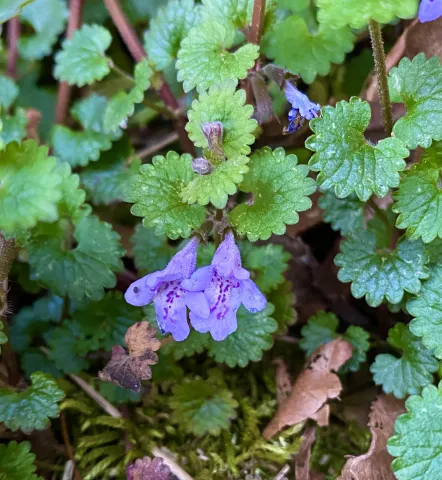Ground Ivy, the Sneak in Your Yard

Ground Ivy can lie hidden in your yard, but you may catch its minty aroma while mowing.
By: Steve Roark
Volunteer, Cumberland Gap National Park
Ground Ivy (Glechoma hederacea) is a small plant that’s possibly in your yard but keeps a low profile so you may not know it. But if you’re ever mowing and suddenly pick up on a minty smell, then you for sure have it. The plant is worth a close look, for its petite bloom and leaves are striking. It has been given many names over the years, including Creeping Charlie, Crow-Victuals, and Gill-Over-The-Ground.
Ground Ivy is a perennial lawn weed that creeps along the ground, often tucked under the grass, and prefers shady, moist areas like under trees and on the north side of the house. The leaves are round to kidney shaped with a bumpy scalloped edge and often has a purplish tinge. The flowers are small and a brilliant blue to violet, with the petals forming a double lower lip structure. They bloom from March to July.
As mentioned, you will likely smell Ground Ivy before you see it, as it’s in the mint family and releases a strong odor when cut or stepped on. Like all mints, this one has a square stem. Ground Ivy was brought over from Europe and escaped gardens to become naturalized here. It has a long history of being used as a medicinal, traditionally for treating lung ailments, asthma, jaundice, kidney ailments, and for blood purification. It was applied externally to treat backaches, bruises, and to reduce swelling. It is reportedly toxic to horses, but this is rare because the bitter taste of the plant discourages consumption. The leaves can be dried and used to make an herbal tea but be sure to try only small quantities at first in case of food allergies.
- Log in to post comments